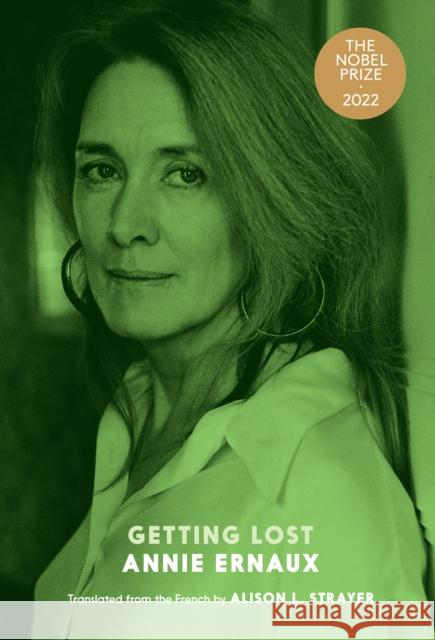Getting Lost » książka



(netto: 69,51 VAT: 5%)
Najniższa cena z 30 dni: 72,03
ok. 8-10 dni roboczych.
Darmowa dostawa!
"Annie Ernaux s work presents a breathtakingly frank, fearless, many-sided account of the female experience during the past century."
Liesl Schillinger, Oprah Daily
"The almost primitive directness of her voice is bracing. It s as if she s carving each sentence onto the surface of a table with a knife. . . . Getting Lost is a feverish book. . . . it s one of those books about loneliness that, on every page, makes you feel less alone."
Dwight Garner, New York Times (also a 2022 Staff Critic Pick)
"Like Anna Karenina and Madame Bovary, Ernaux s affair should be counted as one of the great liaisons of literature. ... I suspect the book will become a kind of totem for lovers: a manual to help them find their centre when, like Ernaux, they are lost in love. All her books have the quality of saving frail human details from oblivion. Together they tell, in fragments, the story of a woman in the twentieth century who has lived fully, sought out pain and happiness equally and then committed her findings truthfully on paper. Her life is our inheritance."
Ankita Chakraborty, The Guardian
"To read [the diary entries] is to encounter something like a pentimento, the revelation of writing underneath other writing a quality that already suffuses so much of her work. We can, of course, marvel at what Ernaux was able to make of these entries in Simple Passion. But they offer their own distinct and potent pleasures, the rare, delightful, occasionally shocking intimacies of reading someone else s private thoughts."
Sophie Haigney, The Paris Review
"In this entrancing work, French writer Ernaux (The Years) relives the passionate yet devastating memories of a whirlwind affair through her own diary entries. From November 1989 to April 1990, when she was a writer and teacher living in Paris, Ernaux became besotted with a married Russian diplomat at the Soviet embassy. Set against the political, social, and literary events that defined the parameters of their relationship, Ernaux s narrative traces her secret love affair with 'Mr. S,' a man 13 years her junior, as she recalls falling under S s narcissistic hold ('a lovely hell') and the 'state of nameless terror' she endures between his phone calls and brief visits. Their affair revives old and painful memories that threaten her self-worth: an abortion in 1964, a failed marriage, and recurring dreams of her mother s death. Ernaux s writing is astonishingly candid as she illustrates the ways loss, heartache, and love intersect with her craft as a writer: 'I am consumed with desire.... I want perfection in love, as I believe I attained a kind of perfection in writing with A Woman s Story. That can only happen through giving, while throwing all caution to the wind. I m already well on my way.' Fans will relish every scintillating detail."
Publishers Weekly
"[Getting Lost] is a scabbed-over wound. Its beauty and meaning which are considerable come from the tension between the diary s immediacy, candor, and occasional luridness, against its intellectual heft as an artifact documenting Ernaux s artistic process. Getting Lost marries the high with the low, the petty with the sacred, the cerebral with the profane, in an exhilarating descent into abject desire."
Mariah Kreutter, Astra Magazine
"Across over twenty books and for the better part of the last five decades, Ernaux has gathered, broken, and reassembled the infinite, singular matter of her history alongside the history of France in the aftermath of two world wars in search of (as Madeline Schwartz writes in a review of Ernaux s A Girl s Story) a story that is fully continuous, a story without gaps. Perhaps no other literary figures, save Proust or Knausgaard, have come as near to achieving so Promethean a project."
Jamie Hood, The Baffler
"Beautiful writing can be a way of 'masking power.' Ernaux's particular style stripped back, forthright, unadorned is an attempt to drop the mask, to write unsentimentally and with great dignity about class, and class mobility, and gender." Lauren Elkin, Lux Magazine
ANNIE ERNAUX is the author of some twenty works of fiction and memoir, winner of the Prix Renaudot for A Man's Place, and of the Marguerite Yourcenar Prize for her body of work, and recently the winner of the International Strega Prize and the French-American Translation Prize and shortlisted for the Man Booker International Prize for The Years. She is now considered by many to be France's most important literary voice. ALISON L. STRAYER is a Canadian writer and translator Her work has been shortlisted for the Governor General's Award for Literature and for Translation, the Grand Prix du livre de Montreal, and the Prix litteraire France-Quebec. She lives in Paris.
1997-2026 DolnySlask.com Agencja Internetowa
KrainaKsiazek.PL - Księgarnia Internetowa









